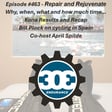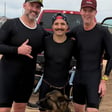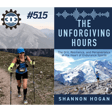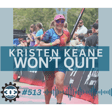
#506 Sue Reynolds Across the Line
Today, we’re honored to welcome back a truly remarkable athlete and author — Sue Reynolds.
You may know Sue from her top-rated memoir The Athlete Inside, where she shared her incredible journey of losing 200 pounds and going from finishing last in local triathlons to placing sixth in the world. But Sue’s story didn’t stop there.
In her upcoming book, Across the Line, Sue dares to ask a bold question: What would happen if an ordinary age-group athlete in her seventies trained with Olympic coaches? The answer takes her on an extraordinary path filled with breakthroughs, setbacks, and powerful lessons in resilience, grit, and self-discovery.
Candid, funny, and deeply inspiring, Across the Line is more than a story about sport — it’s a story about daring to dream bigger, finding strength in unexpected places, and stepping into the question, “Why not me?”
Join us as we dive into Sue’s journey, explore what elite coaching taught her about life and sport, and discover how her story can inspire all of us — no matter our age or starting point.



















